- Home
- Deborah Harkness
The Book of Life Page 24
The Book of Life Read online
Page 24
"Maybe the sale records mention them. We have boxes of paperwork on the Voynich's acquisition. Do you want to see them?" she asked.
The dates of book sales and the names of the people who bought and sold the books could be assembled into a genealogy that described a book's history and descent right down to the present. In this case it might also provide clues as to who might once have owned the pictures of the tree and the dragons that Kelley removed from the Book of Life.
"Absolutely!" I replied.
Lucy boxed up the Voynich and returned it to the locked hold. She returned shortly thereafter with a trolley loaded with folders, boxes, various notebooks, and a tube.
"Here's everything on the Voynich, in all its confusing glory. It's been picked through thousands of times by researchers, but nobody was looking for three missing manuscript pages." She headed toward our private room. "Come on. I'll help you sort through it all."
It took thirty minutes simply to organize the materials on the long table. Some of it would be no use at all: the tube and the scrapbook full of newspaper clippings, the old photostats, and lectures and articles written about the manuscript after the collector Wilfrid Voynich purchased it in 1912. That still left folders full of correspondence, handwritten notes, and a clutch of notebooks kept by Wilfrid's wife, Ethel.
"Here's a copy of the chemical analysis of the manuscript, a printout of the cataloging information, and a list of everyone granted access to the manuscript in the past three years." Lucy handed me a sheaf of papers. "You can keep them. Don't tell anyone I gave you that list of library patrons, though."
Matthew would have to go over the chemistry with me--it was all about the inks used in the manuscript, a subject that interested both of us. The list of people who'd seen the manuscript was surprisingly short. Hardly anyone got to look at it anymore. Those who had been granted access were mostly academics--a historian of science from the University of Southern California and another from Cal State Fullerton, a mathematician-cryptographer from Princeton, another from Australia. I'd had coffee with one of the visitors before leaving for Oxford: a writer of popular fiction who was interested in alchemy. One name jumped off the page, though.
Peter Knox had seen the Voynich this past May, before Emily died.
"That bastard." My fingers tingled, and the knots on my wrists burned in warning.
"Something wrong?" Lucy asked.
"There was a name on the list I didn't expect to see."
"Ah. A scholarly rival." She nodded sagely.
"I guess you could say that." But my difficulty with Knox was more than an argument over competing historical interpretations. This was war. And if I were going to win it, I would need to pull ahead of him for a change.
The problem was that I had little experience tracking down manuscripts and establishing their provenance. The papers I knew best had belonged to the chemist Robert Boyle. All seventy-four volumes of them had been presented to the Royal Society in 1769, and, like everything else in the Royal Society archives, they were meticulously cataloged, indexed, and cross-referenced.
"If I want to trace the Voynich's chain of ownership, where do I start?" I mused aloud, staring at the materials.
"The fastest way would be for one of us to start at the manuscript's origins and work forward while the other starts at the Beinecke's acquisition of it and works backward. With luck we'll meet at the middle." Lucy handed me a folder. "You're the historian. You take the old stuff."
I opened the folder, expecting to see something relating to Rudolf II. Instead I found a letter from a mathematician in Prague, Johannes Marcus Marci. It was written in Latin, dated 1665, and sent to someone in Rome addressed as "Reverende et Eximie Domine in Christo Pater." The recipient was a cleric then, perhaps one of the men I'd seen when I touched the corner of the Voynich's first page.
I quickly scanned the rest of the text, noting that the cleric was a Father Athanasius and that Marci's letter was accompanied by a mysterious book that needed deciphering. The Book of Life, perhaps?
Marci said that attempts had been made to contact Father Athanasius before, but the letters had been met with silence. Excited, I kept reading. When the third paragraph revealed the identity of Father Athanasius, however, my excitement turned to dismay.
"The Voynich manuscript once belonged to Athanasius Kircher?" If the missing pages had passed into Kircher's hands, they could be anywhere.
"I'm afraid so," Lucy replied. "I understand he was quite . . . er, wide-ranging in his interests."
"That's an understatement," I said. Athanasius Kircher's modest goal had been nothing less than universal knowledge. He had published forty books and was an internationally bestselling author as well as an inventor. Kircher's museum of rare and ancient objects was a famous stop on early European grand tours, his range of correspondents extensive, and his library vast. I didn't have the language skills to work through Kircher's oeuvre. More important, I lacked the time.
My phone vibrated in my pocket, making me jump.
"Excuse me, Lucy." I slid the phone out and checked the display. On it was a text message from Matthew.
Where are you? Gallowglass is waiting for you. We have a doctor's appointment in ninety minutes.
I cursed silently.
I'm just leaving the Beinecke, I typed back.
"My husband and I have a date, Lucy. I'm going to have to pick up with this again tomorrow," I said, closing the folder containing Marci's letter to Kircher.
"A reliable source told me you were on campus with someone tall, dark, and handsome." Lucy grinned.
"That's my husband, all right," I said. "Can I look through this stuff tomorrow?"
"Leave everything with me. Things are pretty slow around here at the moment. I'll see what I can piece together."
"Thanks for your help, Lucy. I'm under a tight--and nonnegotiable--deadline." I scooped up pencil, laptop, and pad of paper and rushed to meet Gallowglass. Matthew had seconded his nephew to act as my security detail. Gallowglass was also responsible for monitoring Benjamin's Internet feed, but so far the screen had remained blank.
"Hello, Auntie. You're looking bonny." He kissed me on the cheek.
"I'm sorry. I'm late."
"Of course you're late. You were with your books. I didn't expect you for another hour at least," Gallowglass said, dismissing my apology.
When we got to the lab, Matthew had the image of the alchemical wedding from Ashmole 782 in front of him and was so absorbed that he didn't even look up when the door pinged. Chris and Sherlock were standing at his shoulder, watching intently. Scully sat on a rolling stool nearby. Game Boy had a tiny instrument in her hand and was holding it dangerously close to the manuscript page.
"You get scruffier all the time, Gallowglass. When did you last comb your hair?" Miriam swiped a card through the reader at the door. It was marked VISITOR. Chris was taking security seriously.
"Yesterday." Gallowglass patted the back and sides of his head. "Why? Is a bird nesting in it?"
"One might well be." Miriam nodded in my direction. "Hi, Diana. Matthew will be with you soon."
"What's he doing?" I asked.
"Trying to teach a postgraduate student with no knowledge of biology or proper laboratory procedures how to remove DNA samples from parchment." Miriam looked at the group surrounding Matthew with disapproval. "I don't know why Roberts funds creatures who don't even know how to run agarose gels, but I'm just the lab manager."
Across the room Game Boy let out a frustrated expletive.
"Pull up a stool. This could be a while." Miriam rolled her eyes.
"Don't worry. It takes practice," Matthew told Game Boy, his voice soothing. "I'm nothing but thumbs with that computer game of yours. Try again."
Again? My mouth dried up. Making repeated stabs at the page from Ashmole 782 might damage the palimpsest. I started toward my husband, and Chris spotted me.
"Hey, Diana." He intercepted me with a hug. He looked at Gallowglass. "I'm Chris Roberts. Diana's f
riend."
"Gallowglass. Matthew's nephew." Gallowglass surveyed the room, and his nose wrinkled. "Something stinks."
"The grad students played a little joke on Matthew." Chris pointed to the computer terminal, which was festooned with wreaths of garlic bulbs. A crucifix designed for a car dashboard was attached to the mouse pad with a suction cup. Chris turned his attention to Gallowglass's neck with an intensity that was practically vampiric. "Do you wrestle?"
"Weeell, I have been known to do so for sport." Gallowglass looked down shyly, his cheeks dimpled.
"Not Greco-Roman by any chance?" Chris asked. "My partner injured his knee and will be in rehab for months. I'm looking for a temporary replacement."
"It must be Greek. I'm not sure about the Roman part."
"Where did you learn?" Chris asked.
"My grandfather taught me." Gallowglass scrunched up his face as his concentration deepened. "I think he wrestled a giant once. He was a fierce fighter."
"Is this a vampire grandfather?" Chris asked.
Gallowglass nodded.
"Vampire wrestling must be fun to watch." Chris grinned. "Like alligator wrestling, but without the tail."
"No wrestling. I'm serious, Chris." I wanted no responsibility, no matter how indirect, for causing bodily harm to a MacArthur genius.
"Spoilsport." Chris let out a piercing whistle. "Wolfman! Your wife is here."
Wolfman?
"I was aware of that, Christopher." Matthew's tone was frosty, but he gave me a warm smile that made my toes curl. "Hello, Diana. I'll be with you as soon as I'm finished with Janette."
"Game Boy's name is Janette?" Chris murmured. "Who knew?"
"I did. So did Matthew. Perhaps you could tell me why she's in my lab?" Miriam asked. "Janette's Ph.D. will be in computational bioinformatics. She belongs in a room full of terminals, not test tubes."
"I like the way her brain works," Chris said with a shrug. "She's a gamer and sees patterns in lab results that the rest of us miss. So she never did advanced work in biology. Who cares? I'm up to my eyeballs in biologists already."
Chris looked at Matthew and Game Boy working together and shook his head.
"What's wrong?" I asked.
"Matthew is wasted in a research laboratory. Your husband belongs in a classroom. He's a born teacher." Chris tapped Gallowglass on the arm. "Call me if you want to meet up in the gym. Diana has my number."
Chris went back to his work and I turned my attention to Matthew. I'd only seen flashes of this side of my husband, when he was interacting with Annie or Jack in London, but Chris was right. Matthew was using all the tools in a teacher's bag of tricks: modeling, positive reinforcement, patience, just the right amount of praise, and a touch of humor.
"Why can't we just swab the surface again?" Game Boy asked. "I know it came up with mouse DNA, but if we picked a fresh spot, it might be different."
"Maybe," Matthew said, "but there were a lot of mice in medieval libraries. Still, you should feel free to swab it again after you've taken this sample."
Game Boy sighed and steadied her hand.
"Deep breath, Janette." Matthew gave her an encouraging nod. "Take your time."
With great care Game Boy inserted a needle so fine it was almost invisible into the very edge of the parchment.
"There you go," Matthew said softly. "Slow and steady."
"I did it!" Game Boy shouted. You would have thought she'd split the atom. There were whoops of support, a high five, and a muttered "About time" from Miriam. But it was Matthew's response that mattered. Game Boy turned to him expectantly.
"Eureka," Matthew said, his hands spread wide. Game Boy grinned broadly. "Well done, Janette. We'll make a geneticist out of you yet."
"No way. I'd rather build a computer from spare parts than do that again." Game Boy stripped her gloves off quickly.
"Hello, darling. How was your day?" Matthew rose and kissed me on the cheek. One eyebrow lifted as he looked at Gallowglass, who silently conveyed that all was well.
"Let's see . . . I worked some magic in the Beinecke."
"Should I worry?" Matthew asked, clearly thinking of the havoc that witchwind and witchfire might cause.
"Nope," I said. "And I have a lead on one of the missing pages from Ashmole 782."
"That was quick. You can tell me about it on our way to the doctor's office," he said, swiping his card through the reader.
"By all means take your time with Diana. There's nothing pressing here. One hundred and twenty-five vampire genes identified and only four hundred to go," Miriam called as we left. "Chris will be counting the minutes."
"Five hundred genes to go!" Chris shouted.
"Your gene prediction is way off," Miriam replied.
"A hundred bucks says it's not." Chris glanced up from a report.
"That the best you can do?" Miriam pursed her lips.
"I'll empty my piggy bank when I get home and let you know, Miriam," Chris said. Miriam's lips twitched.
"Let's go," said Matthew, "before they start arguing about something else."
"Oh, they're not arguing," Gallowglass said, holding the door open for us. "They're flirting."
My jaw dropped. "What makes you say that?"
"Chris likes to give people nicknames." Gallowglass turned to Matthew. "Chris called you Wolfman. What does he call Miriam?"
Matthew thought for a moment. "Miriam."
"Exactly." Gallowglass grinned from ear to ear.
Matthew swore.
"Don't fret, Uncle. Miriam hasn't given any man a tumble since Bertrand was killed."
"Miriam . . . and a human?" Matthew sounded stunned.
"Nothing will come of it," Gallowglass said soothingly as the elevator doors opened. "She will break Chris's heart, of course, but there's naught we can do about it."
I was deeply grateful to Miriam. Now Matthew and Gallowglass had someone to worry about besides me.
"Poor lad." Gallowglass sighed, pushing the button that closed the elevator doors. As we descended, he cracked his knuckles. "Perhaps I will wrestle with him after all. A good thrashing always clears the mind."
A few days ago, I'd worried whether the vampires would survive being at Yale once the students and faculty were around.
Now I wondered whether Yale would survive the vampires.
I stood in front of the refrigerator, staring at the images of our children with my hands curved around my belly. Where had the month of September gone?
The three-dimensional ultrasound pictures of Baby A and Baby B--Matthew and I had elected not to learn the sexes of our two children--were uncanny. Instead of the familiar ghostly silhouette I'd seen in friends' pregnancy scans, these revealed detailed images of faces with crinkled brows, thumbs rammed into mouths, perfectly bowed lips. My finger reached out, and I touched Baby B's nose.
Cool hands slid around me from behind, and a tall, muscular body provided a strong pillar for me to rest against. Matthew pressed lightly on a spot a few inches above my pubic bone.
"B's nose is just there in that picture," he said softly. His other hand rested a bit higher on the swell of my belly. "Baby A was here."
We stood silently as the chain that had always joined me to Matthew extended to accommodate these two bright, fragile links. For months I had known that Matthew's children--our children--were growing inside me. But I had not felt it. Everything was different now that I'd seen their faces, crumpled in concentration as they did the hard work of becoming.
"What are you thinking?" Matthew asked, curious about my extended silence.
"I'm not thinking. I'm feeling." And what I was feeling was impossible to describe.
His laugh was soft, as though he didn't want to disturb the babies' sleep.
"They're both all right," I assured myself. "Normal. Perfect."
"They are perfectly healthy. But none of our children will ever be normal. And thank God for that." He kissed me. "What's on your schedule for today?"
"More
work at the library." My initial, magical lead that had promised to reveal the fate of at least one of the Book of Life's missing pages had turned into weeks of hard, scholarly slogging. Lucy and I had been working steadily to discover just how the Voynich manuscript came into Athanasius Kircher's hands and later into Yale's possession, hoping to catch a trace of the mysterious tree image that had remained superimposed on the Voynich for a few precious moments. We'd set up camp in the same small private room where I'd worked my spell so that we could talk without disturbing the growing number of students and faculty using the Beinecke's adjacent reading room. There we'd pored over library lists and indexes of Kircher's correspondence, and we'd written dozens of letters to various experts in the United States and abroad--with no concrete results.
"You're remembering what the doctor said about taking breaks?" Matthew asked. With the exception of the ultrasound, our trip to the doctor's office had been sobering. She had drummed into me the dangers of premature labor and preeclampsia, the necessity of staying hydrated, my body's additional need for rest.
"My blood pressure is fine." This, I understood, was one of the biggest risks: that through a combination of dehydration, fatigue, and stress, my blood pressure would suddenly spike.
"I know." Monitoring my blood pressure was my vampire husband's responsibility, and Matthew took it seriously. "But it won't remain that way if you push yourself."
"This is my twenty-fifth week of pregnancy, Matthew. It's almost October."
"I know that, too."
After October 1 the doctor was grounding me. If we remained in New Haven where we could continue working, the only way to get to the Bodleian Library would be by some combination of boat, plane, and automobile. Even now I was restricted to flights of no more than three hours.
"We can still get you to Oxford by plane." Matthew knew of my concerns. "It will have to stop in Montreal, and then Newfoundland, Iceland, and Ireland, but if you must get to London, we can manage it." His expression suggested that he and I might have different ideas about what circumstances would justify my crossing the Atlantic in this hopscotch fashion. "Of course, if you'd prefer we can go to Europe now."
"Let's not borrow trouble." I pulled away from him. "Tell me about your day."
"Chris and Miriam think they have a new approach to understanding the blood-rage gene," he said. "They're planning to trawl through my genome using one of Marcus's theories about noncoding DNA. Their current hypothesis is that it might contain triggers that control how and to what extent blood rage manifests in a given individual."

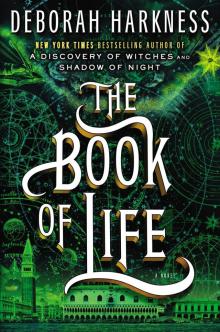 The Book of Life
The Book of Life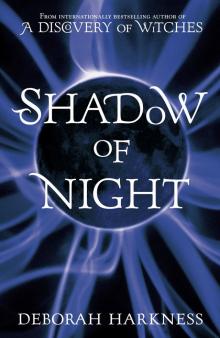 Shadow of Night
Shadow of Night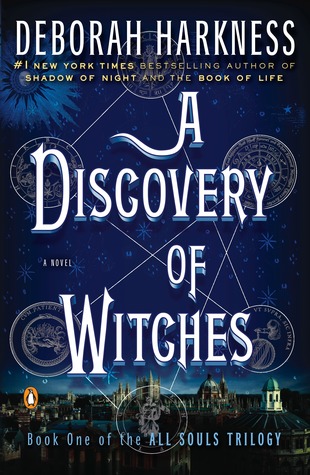 A Discovery of Witches
A Discovery of Witches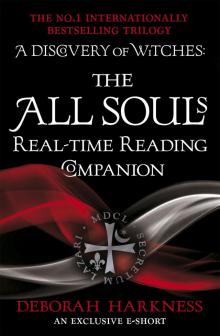 The All Souls Real-Time Reading Companion
The All Souls Real-Time Reading Companion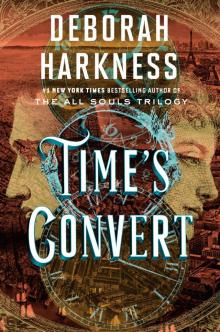 Time's Convert
Time's Convert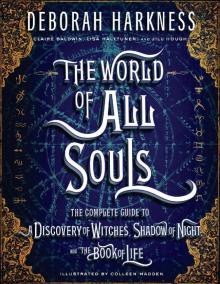 The World of All Souls
The World of All Souls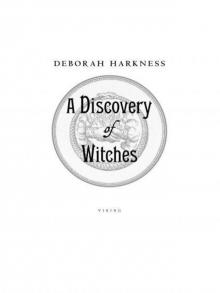 A Discovery of Witches: A Novel (All Souls Trilogy)
A Discovery of Witches: A Novel (All Souls Trilogy)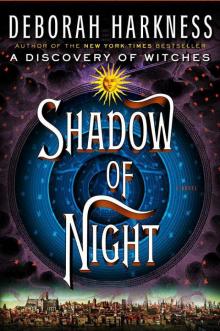 Shadow of Night: A Novel
Shadow of Night: A Novel